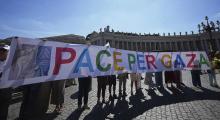Issued by the Catholic Center for Studies and Media - Jordan. Editor-in-chief Fr. Rif'at Bader - موقع أبونا abouna.org

A new book launched this week: 'After Secularization: The Present and Future of British Catholicism' by the Catholic Truth Society, tells the story of 'The Quiet Revival'.
The Catholic Church in Britain is not dying out - far from it. While the data shows that Mass attendance did fall steeply over the past decades, 'After Secularization' gives both principled and statistical reasons for hope regarding the future.
Authors Bernadette Durcan, Dr Hannah Vaughan-Spruce and Professor Stephen Bullivant explore what happens after a society has become as secular as it can, how COVID changed things and how Gen Z Catholics are swimming against the cultural tide. Their research covers the contexts of Parishes, Youth Movements and Initiatives, Diasporas, University Chaplaincies and Catholic Societies and the Latin Mass.
Building on prior work, Stephen Bullivant (author of Mass Exodus: Catholic Disaffiliation in Britain and America Since Vatican II), Hannah Vaughan-Spruce and Bernadette Durcan, examine where 'creative minorities' can currently be found within the life of the Catholic Church in England, Wales, and Scotland, specifically in groupings (parishes or otherwise, lay or clergy) that contain committed, Mass-going young adults.
The strong attachment to and observance of the Catholic faith displayed by young adults in certain distinct settings seem to offer signs of hope and renewal against an otherwise worrying backdrop of declining congregations, closing parishes, and cradle Catholics abandoning their religion in large numbers.
The fervor that Bullivant et al. uncover is starting to seep into the statistics. These numbers might not predict a wholesale revival of Christian society, but the future of the Church in Britain looks devoted, faithful, passionate, and very real.
'So, after secularization, what is, or will be, the state of the Catholic Church (or any other religious body) in Britain?
Even if Britain as a whole has some more secularizing to do, then the young adult milieu ought by now to be about as secularized as possible. Hence there is a sense in which our close-knit groups of defiantly religious swimmers-against-the-stream are doing so 'after secularization', because their wider social world in which all this is taking place is already more-or-less at 'peak secularization'. As we have argued, their very committees are, in large measure, a side-effect of, and reaction to, their highly secularized environment.
That, at least, is a large part of the (mostly implicit) argument of the book. While it is not a book only about young adult Catholics - indeed, a striking feature of several of our case studies is precisely their multigenerational nature - they naturally feature heavily. It is, after all, a book about the present and future of British Catholicism. Today's young adults, and their current and future children, are critical to both.'







